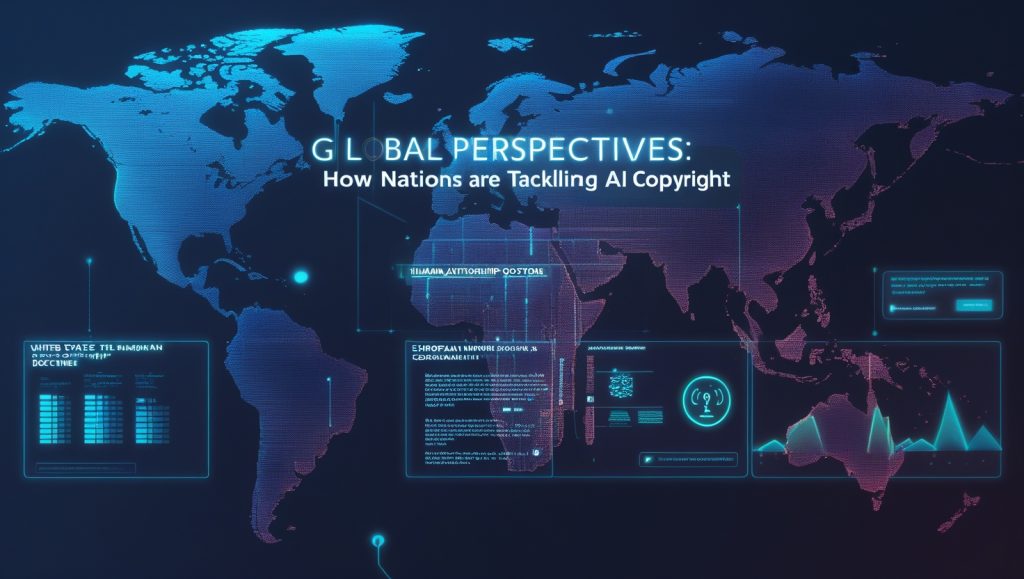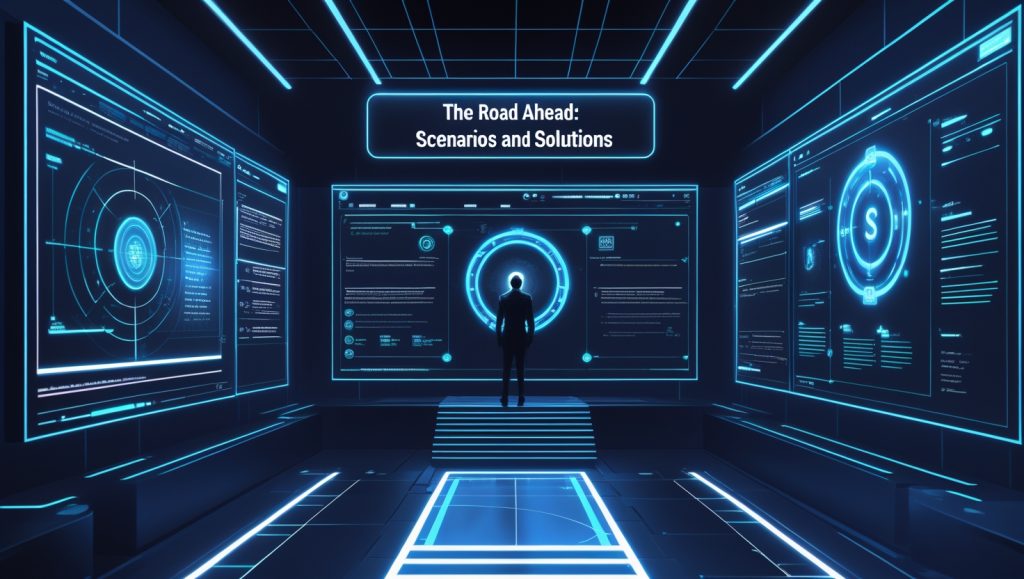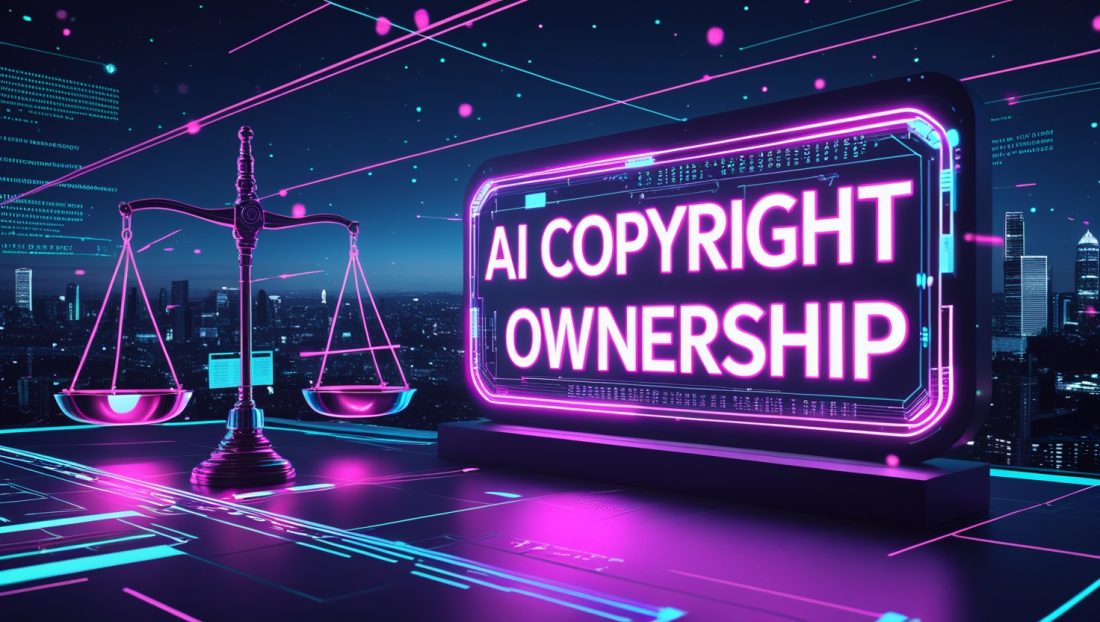A Provocative Start
What happens when a machine creates art that rivals human genius? In 2023, an AI-generated portrait sold at Christie’s for $432,500, igniting a firestorm over AI copyright ownership. Today, this debate has exploded into a global conflict involving courts, governments, and billion-dollar corporations. As generative AI reshapes industries, the question of who owns its output—and why it matters—has never been more urgent. To understand the broader stakes, explore Why AI Ethics Could Save or Sink Us.
Generative AI and Copyright Law: A Collision of Innovation and Tradition
Generative AI systems like ChatGPT, DALL-E, and Stable Diffusion analyze vast datasets to produce text, images, and code. Unlike traditional tools, these systems operate with minimal human intervention, blurring the lines of authorship. The U.S. Copyright Office’s mandate that works require “human authorship” now clashes with AI’s autonomous capabilities, creating a legal gray zone for AI copyright ownership.
Key Issue: If a user inputs “paint a surrealist landscape” into MidJourney, who owns the output—the user, the AI developer, or the artists whose work trained the model? This question fuels the fight for generative AI rights.
Why AI Copyright Ownership Upends Legal Norms
The struggle over AI copyright ownership stems from AI’s ability to create without clear human direction, challenging centuries-old copyright laws. This AI content legality issue forces lawmakers to rethink authorship, as AI outputs blur the line between tool and creator. For more on AI’s legal disruptions, see AI in Judicial Decisions: 5 Stunning Breakthroughs.
Landmark Legal Battles Defining AI Copyright Ownership
Thaler v. U.S. Copyright Office: The AI as Author Experiment
In 2022, Dr. Stephen Thaler challenged the U.S. Copyright Office by listing his AI system, DABUS, as the creator of a fractal artwork. The court’s rejection underscored a global precedent: AI cannot hold copyrights. However, the ruling left ambiguity about human collaborators in AI copyright ownership. As Harvard Law Professor Rebecca Tushnet notes, “The law is playing catch-up with technology, and the lack of clarity stifles innovation.”
Why Thaler’s Defeat Shapes AI Copyright Ownership
Thaler’s case wasn’t just bold—it exposed how unprepared laws are for AI copyright ownership. By denying AI authorship, courts reaffirmed human-centric rules, but the gray area around collaboration invites more lawsuits. This fight over copyright for AI works could redefine innovation, as global policies diverge. Check out Why China’s Manus AI Redefines Global Tech Power for contrasting approaches.
Getty Images v. Stability AI: The Data Scraping War
Getty’s lawsuit against Stability AI alleges the unauthorized use of 12 million copyrighted images to train Stable Diffusion. This case could redefine “fair use” in AI training, a key aspect of AI copyright ownership. If Stability AI loses, developers may face costly licensing requirements, reshaping AI copyright ownership economics.
Why Getty’s Case Could Break AI Copyright Ownership
The Getty lawsuit threatens to upend AI copyright ownership by questioning how AI is trained. A ruling against Stability AI could force developers to pay for every image, making AI content legality a costly hurdle. This could chill innovation or protect artists, depending on the balance struck. Dive deeper into AI’s ethical risks at Why the Dark Side of AI Threatens Our Future.
Zarya of the Dawn: A Partial Human Victory
Artist Kris Kashtanova secured copyright for a graphic novel featuring MidJourney-generated art—but only for the human-curated elements (text, layout). The U.S. Copyright Office revoked protection for AI images, emphasizing the necessity of “meaningful human input” in AI copyright ownership.
The New York Times v. OpenAI: Journalism in the Crosshairs
In a 2023 landmark case, The New York Times sued OpenAI for allegedly scraping articles to train ChatGPT. The outcome could set precedents for how AI uses copyrighted text, impacting publishers and developers globally in AI copyright ownership.
China’s 2023 Precedent: Human-Led AI Works Protected
A Beijing court granted copyright to an AI-generated financial article, citing the “intellectual investment” in training the model. This contrasts sharply with Western approaches, highlighting global divides in AI copyright ownership philosophy.
Global Perspectives: How Nations Are Tackling AI Copyright

United States: The Human Authorship Doctrine
The U.S. rigidly ties copyright to human creation. However, the Copyright Office’s 2023 guidance allows protection for AI-assisted works if humans “exercise creative control.” This vague standard leaves room for litigation over AI copyright ownership.
Why U.S. Laws Lag on AI Copyright Ownership
The U.S.’s human-only copyright rule struggles with AI copyright ownership, as AI tools grow more autonomous. This creates uncertainty for creators and businesses, with courts left to untangle copyright for AI works. For a look at global contrasts, read Why China’s Industrial Robot Dominance Is Reshaping Global Manufacturing.
European Union: Transparency and Accountability
The EU’s AI Act (slated for 2024) mandates that generative AI systems disclose copyrighted training data. This could force developers to license datasets, altering AI copyright ownership dynamics.
Japan: Commercialization Without Ownership
Japan’s 2023 AI Strategy Report denies copyright to AI-generated works but permits commercialization. This pragmatic approach aims to boost AI adoption while sidestepping AI copyright ownership debates.
India: A Vacuum Waiting to Be Filled
India lacks specific AI copyright laws, creating uncertainty. A 2023 Delhi High Court case involving AI-generated music deferred to existing copyright frameworks, urging legislative action on AI copyright ownership.
Stakeholders at Risk: Creators, Businesses, and Developers
For Creators: Monetization in the AI Era
Digital artists like Sarah Andersen (of “Sarah’s Scribbles”) argue AI tools threaten livelihoods by replicating styles without compensation. Platforms like DeviantArt now offer opt-out options for AI training, but enforcement remains spotty, complicating AI copyright ownership.
Why Artists Battle for AI Copyright Ownership
Creators fear AI’s ability to copy styles erodes their generative AI rights, as tools scrape portfolios without consent. Weak platform protections leave artists fighting for AI copyright ownership in court, pushing some to blockchain for proof of work. See how tech protects creators in Why Drone Delivery Networks Are the Next Billion-Dollar Hustle.
For Businesses: Legal Landmines
Companies using AI for marketing or product design risk lawsuits if training data includes copyrighted material. In 2023, Adobe launched Firefly, trained on licensed stock images, to mitigate these risks—a model others may follow for AI copyright ownership clarity.
For Developers: Liability and Innovation
Open-source AI projects face existential threats. If courts hold developers liable for user-generated content, innovation could slow. As GitHub CEO Thomas Dohmke warns, “We need balanced regulations that protect rights without stifling collaboration” in AI copyright ownership.
Ethical and Philosophical Dilemmas
Beyond legality, AI raises existential questions:
- Originality: Can AI produce “new” ideas, or is it remixing existing works?
- Labor Equity: Should artists receive royalties when AI mimics their style?
- Cultural Impact: Does AI homogenize creativity by prioritizing popular datasets?
These debates mirror historical shifts like photography’s 19th-century legal battles. Just as courts eventually recognized photos as art, AI copyright ownership may yet carve its niche. For more on AI’s societal impact, check Why AI Companions Are the Future of Therapy, Friendship, and Ethics.|
The Road Ahead: Scenarios and Solutions

Scenario 1: The Human Threshold Standard
Courts could adopt a “human threshold” test, granting copyright only if users guide AI outputs through iterative prompts. This approach balances innovation with accountability for AI copyright ownership.
Scenario 2: New IP Categories
The World Intellectual Property Organization (WIPO) proposes a “sui generis” right for AI works, offering limited-term protections. This mirrors the EU’s database rights, tailored for AI copyright ownership. WIPO’s 2024 report outlines how such frameworks could balance innovation and creator rights globally WIPO AI and IP Conversation Report.
Scenario 3: Blockchain and Provenance Tracking
Startups like Veracity Protocol use blockchain to timestamp AI training data and outputs, creating auditable ownership trails. Such tools could become industry standards for AI copyright ownership.
For a deeper analysis of regulatory trends, explore our guide on Global AI Regulation Trends Shaping 2024 (repurposed for regulation alignment).
Why Blockchain Secures AI Copyright Ownership
Blockchain’s immutable logs could resolve AI copyright ownership disputes by proving who shaped an AI’s output. This ensures AI content legality through transparent records, cutting legal risks for developers and artists. Blockchain’s rise mirrors fintech trends, as seen in Why AI in Finance Disrupts Robo-Advisors, Fraud.
Navigating the AI Copyright Landscape: A Practical Guide
- Document Creative Control: Record prompts, edits, and iterations to prove human input for AI copyright ownership.
- Audit Training Data: Use tools like Spawning’s “Have I Been Trained?” to check if your work is in AI datasets, safeguarding generative AI rights.
- Leverage Licensing: Platforms like Shutterstock now offer AI-generated content licenses, providing clarity for AI copyright ownership.
FAQ: Answering Top AI Copyright Questions
Q: Can AI hold copyright?
A: No. Current U.S. and EU laws require human authorship, though China’s 2023 ruling hints at exceptions for AI copyright ownership.
Q: Who owns AI-generated content?
A: It depends. Users may own outputs if they provide creative input; developers might claim AI copyright ownership via terms of service.
Q: Is AI training data “fair use”?
A: Unclear. Courts are divided—the Getty v. Stability AI case may set a precedent for AI copyright ownership.
Q: How can artists protect their work from AI?
A: Use tools like Glaze to “cloak” images, making them unusable for AI training, preserving generative AI rights.
Q: What penalties exist for AI copyright infringement?
A: Fines up to $150,000 per work in the U.S., though no AI-specific penalties exist yet for AI copyright ownership violations.
The Stakes of Silence
The AI copyright ownership crisis isn’t a niche legal debate—it’s a pivotal moment for the future of creativity and commerce. Without clear frameworks, distrust in AI will grow, stifling its potential. As we navigate this uncharted territory, collaboration between lawmakers, technologists, and creators is essential. For a fearless take on AI’s future, read Why AI as the Last Invention Could End Humanity.
Stay ahead of the curve.
